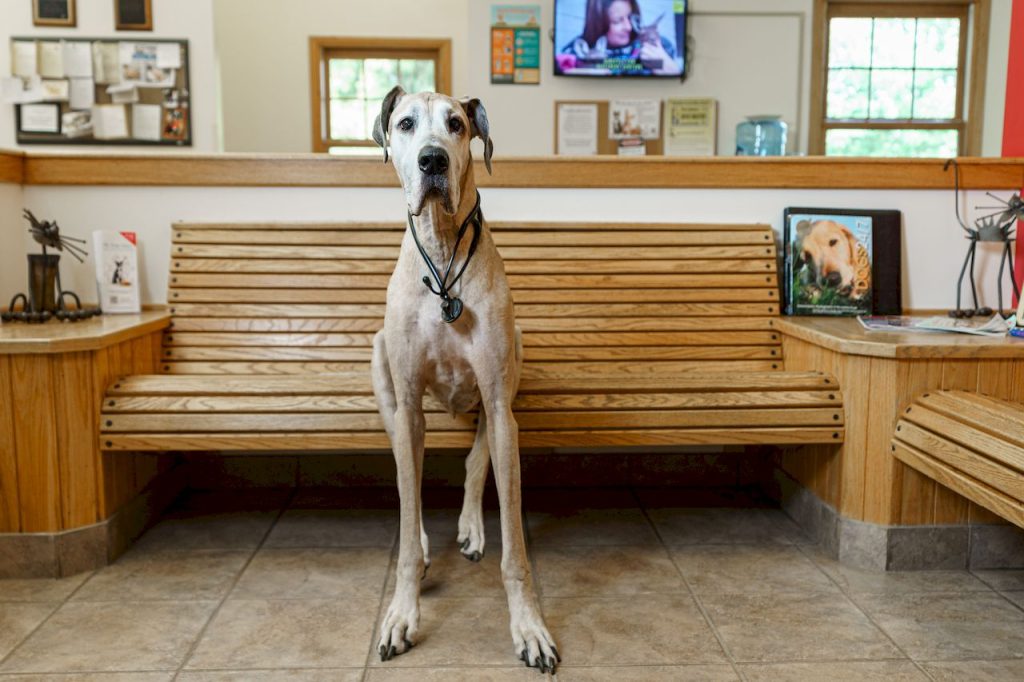Preventative Health Care Services

Why Preventative Care Is So Important
Prevention is the key to your pet’s long-term health. It is also an important factor in minimizing the lifetime cost of care. We recommend a regimen of routine wellness exams, vaccinations, lab work, deworming and fecal checks to keep your pet in optimum health. We can also prescribe medications to prevent heartworm, fleas and ticks.
Most laboratory tests can be done during your dog or cat’s regular exam. These exams are a chance to assess your pet’s overall health, discuss any changes we see, educate and update you on advancements in veterinary care, and for you to discuss any concerns or questions you may have.
What Your Pet's Wellness Exam Includes
- Examine your pet's teeth, throat, and oral cavity
- Examine the eyes and check your pet's vision, if needed.
- Examine the ears for infection, ear mites, allergies and other related health issues
- Examine your pet's heart and respiratory system
- Palpate lymph nodes and abdomen
- Inspect the skin
- Palpate joints and muscles for arthritis and other orthopedic conditions
- Test to evaluate the function of internal organs, blood, and other systems
Parasite Prevention and Treatment
Dangerous parasites are present in almost any environment. If brought into your home, these parasites can be passed from your pet to you and your family. We normally associate parasites, such as roundworms, tapeworms, and hookworms, with cats and dogs, but people can also be infected.
Regular fecal checks and deworming are the best way to prevent parasitic disease and the transmission of intestinal parasites to your pet. It also prevents the shedding of parasite eggs, which contaminate yards or any place a pet defecates.
Routine Blood Work
Preventive Medications
Vaccinations
Immunizations are one of the best tools we have available in preventive medicine. The key to using vaccines appropriately is to determine which diseases each particular pet may be at risk for and then vaccinate for those diseases no more than necessary.
We believe that our balanced approach to vaccines is the best way to protect your pet from disease and minimize the risk of an adverse reaction to a vaccine.
The core vaccines we deliver for dogs are: Rabies and DHPP (the Canine Distemper, Parvo combination vaccine).
The core vaccines we deliver for cats are: Rabies and FVRCP (the Feline Distemper combination vaccine).
Non-core vaccinations we offer are Leptospirosis and Lyme for dogs, and Feline Leukemia for cats.
For puppies, we recommend DAPP and Bordetella (oral) at 8 weeks; DHLPP, Bordetella (oral) and Lyme vaccinations at 12 weeks; and DHLPP, Lyme and Rabies at 16 weeks.
For adult dogs (at least 1 year old), we recommend Rabies and DHPP every three years; and Leptospirosis, Lyme and Bordetella annually.
For Kittens, we recommend FVRCP at 8 weeks; FVRCP and FeLV at 12 weeks; and FVRCP, FeLV, and rabies at 16 weeks.
For adult cats: Rabies, feline distemper, and feline leukemia annually.
Senior Pet Care
Taking a moment to learn more about the special needs of your senior pet is the first step toward providing the best care for your friend in its later years. At Pitman Animal Hospital, we place a special emphasis on senior care and are proud of the special interest we take in geriatric medicine, and chronic disease care.
Pets that are about six years of age or older begin to go through a gradual reduction of their physical capabilities. This process can be slowed and managed through proper veterinary care that can provide your pet an extended period of vitality and good health. Preventive care, tailored to your pet’s age, lifestyle, risk factors and other elements, can help prevent common diseases or detect them at early and easily-treatable stages.
There is also an important role for you to play as your pet’s primary caregiver. You can influence your pet’s activity level, living conditions, access to quality senior veterinary care, and daily nutrition. With your veterinarian’s help, you can manage these factors in order to prolong your pet’s good health, vitality, and increase his or her well-being even as his or her pace slows a bit.
The best time to begin your pet’s senior care program and recognize the need for a little extra TLC is before age-related conditions begin to set in. Pitman Animal Hospital recommends regular senior wellness exams, which should include specialized lab work to detect the early signs of disease processes. Dental care at this point in life also becomes even more important. We recommend routine dental exams and cleanings for all pets, especially those in their senior years. Diet and weight gain are important issues to watch out for. When you bring your pet in for a senior wellness visit we will evaluate his or her weight and offer recommendations based on what we see.
Microchipping
How would you find a lost pet if its tag became lost or unreadable, or if you were traveling? Microchips solve that problem.
Getting lost is the number one cause of pet death. Studies have shown that more than 10 million pets get lost each year and about 90 percent would not be returned unless they have some form of permanent lost pet identification.
This is why Pitman Animal Hospital uses the HomeAgain microchip as a standard of care for all of our feline and canine patients. With a microchip, your pet can be identified quickly and easily by animal control officers, shelters or at veterinary hospitals. Microchips are safe, unalterable and permanent identification for pets.
The HomeAgain microchip system comes with a number of valuable benefits for you: customer service seven days per week, 24 hours per day, and worldwide coverage since HomeAgain’s microchips can be read by any International Organization for Standardization (ISO) compliant scanner in the world.
Book An Appointment
View All of Services
Quick Find
HOURS
Mon – Fri: 8am – 8pm
Sat: 8am – 12pm
Closed Sundays






